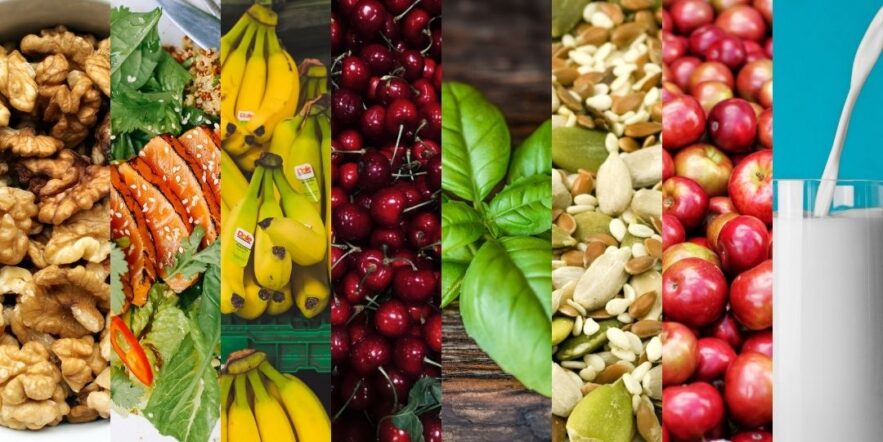✅ This article was reviewed by Alison Acerra, MS, RDN, member of our MedShadow Medical Advisory Board.
Nutritionist Backed Foods To Fight Insomnia
Before reaching for the sleeping pills, try looking around your kitchen. These nutritionist-backed approaches may help you fall — and stay — asleep. Learn the 8 foods that fight insomnia.
Has COVID-19 affected your nights as well as your days? A 2020 study published in Sleep Medicine found a 37% increase in rates of insomnia from before to the peak of the COVID pandemic in China, and while there’s no study to show it, Americans are probably experiencing the same sleeplessness.
Insomnia — defined as a persistent inability to fall and stay asleep — is distressingly common in the US even without a pandemic. Between 30% to 35% of Americans have at least mild issues with falling or staying asleep, according to the American Academy of Sleep Medicine. Sleeping pills are a go-to option for 9 million Americans but they come with a slew of side effects such as headaches, dizziness, daytime sleepiness, dry mouth, constipation, and more seriously, driving while asleep, that may pose a risk to your health. Is there a better way to get a good night’s sleep without a pill? Try one or more of these nutritionist-backed remedies.
1. Reach For Some Walnuts
Walnuts are good for heart health and add crunch and a dose of beneficial fat to all sorts of dishes, but they’ve also been found, in research, to contain their own form of melatonin, a hormone that helps our bodies regulate a healthy sleep-wake cycle. “Try snacking on a small handful about 20 minutes before bed to help you relax and reach a deeper state of restful sleep,” says Erin Palinski-Wade, RD, CDE, author of Belly Fat Diet For Dummies.
2. Make Sure You Get Enough Vitamin B6 in foods that fight insomnia
“When we fall asleep, levels of serotonin rise and adrenaline levels fall. Serotonin, the relaxing hormone, is partly made from the amino acid tryptophan, which is activated by vitamin B6,” says Mary Hartley, RD, a consulting nutritionist from Providence, RI. According to a report on the effects of diet on sleep, published in the journal Nutrition Research, foods impacting the availability of tryptophan may be among the most helpful in promoting sleep. “B6 deficiency is rare in the United States, but it can happen to anyone who eats a poor quality diet. Vitamin B6 is found in a wide variety of foods such as fortified breakfast cereals, potatoes, fish, chicken, bananas, beans, peanut butter, and many vegetables.”
3. Nosh on Bananas
“Bananas help fight insomnia in three powerful ways.” They are a source of magnesium, serotonin, and melatonin,” both precursors to melatonin and serotonin, important hormones that regulate sleep says Palinski-Wade. “Serotonin is a neurotransmitter that helps to regulate sleep as well as mood and appetite and magnesium promotes sleep by helping to decrease the level of cortisol in the body, a hormone that is known to interrupt sleep.”
4. Try Tart Cherry Juice
This refreshing juice contains melatonin, flavonoids and other compounds thought to promote sleep. In a study in the American Journal of Therapeutics, a small sample of older adults with insomnia who were given 8 ounces of tart cherry juice, twice a day for two weeks, slept an average of 84 minutes longer per night [than those given a placebo], says nutritionist Kayleen St. John, RD, adjunct professor of nutrition in food studies at New York University inNew York City.
“Other study data has shown a significant elevation in melatonin in groups consuming cherry juice, leading to increased total sleep time. This isn’t to say we should all increase our juice intake (like all juice, it contains a lot of sugar), but consider adding tart cherry juice to a smoothie, or having a small serving in the evening to see how it affects your sleep.”
5. Befriend Basil
“This plant actually contains sedative properties, which can help you fall asleep and stay asleep. And as a bonus, it not only helps promote sleep, but can help reduce indigestion,” says Palinski-Wade, which is itself a major sleep-interrupter. “Research on this shows the sedative properties come mostly from the hydroalcoholic extract and essential oil of O. basilicum (basil). So we possibly can say incorporating essential oil from basil seeds would be a good way to gain these benefits. There are liquid basil extracts available on the market that can be used to flavor food, as a supplement, or as an essential oil,” she adds.
6. Maximize Magnesium
“Look for foods higher in magnesium and discover magnesium rich foods that fight insomnia.. Up your intake of foods like seeds, nuts and leafy greens for a better night’s sleep, since research has shown that even a slight lack of this mineral can prevent your brain from ‘turning off’ at night,” says St. John. “A study in the Journal of Research and Medical Sciences found that supplementation of 500 mg of magnesium appears to improve insomnia in the elderly — in food terms, that’s about ½ cup of pumpkin seeds and 1 cup of cooked leafy greens daily.”
7. Eat an Hour Before Bed
Enjoying a small and nutritious snack could help you fall and stay asleep. “Getting in a small snack an hour before bed helps to stabilize blood sugars,” says Lisa Hayim, registered dietitian and founder of The Well Necessities. “When blood sugar is low, or even too high, we become anxious and irritable, which will not promote sleep.” Make sure you steer clear of anything greasy, fried, caffeinated or sugar-laden. Hayim recommends an apple with a tablespoon of nut butter or half a banana with four crushed walnuts.
8. Drink a Glass of Milk
“Milk may help control melatonin production since it is a great source of calcium, a mineral that plays a role in the regulation of melatonin in the body,” explains Palinski-Wade. “Milk is also rich in the amino acid tryptophan which is a precursor of melatonin and has a calming effect on the body.”
Interestingly, milk collected from cows at night, known as night milk, may be particularly helpful in promoting sleep. In a lab study published in the Journal of Medicinal Food, mice were given night milk, day milk (milk collected during the day) or Valium (diazepam), a sedative and antianxiety drug, followed by a sleep-inducing drug. Mice that drank night milk fell asleep more quickly, slept for a longer duration and had reduced anxiety compared to mice that drank day milk. These effects were similar to those seen in the mice treated with Valium. The researchers attributed these benefits to exceptionally high amounts of tryptophan and melatonin in night milk. A comparable product is not yet available in the United States, but the researchers suggest that night milk might be an effective natural aid for managing sleep-related disturbances and a promising alternative for the treatment of anxiety disorders.
BONUS: Know Your Caffeine Limit
About 85% of Americans drink at least one caffeinated beverage every day, mainly coffee. You already know that caffeine stimulates your system (After all, if you drink coffee, tea or cola, the pick-me-up caffeine provides is probably a good part of the reason you do so). But while many people claim they can down coffee an hour before bed and sleep just fine, that’s not true for most of us and may not be true for everyone who brags they can sip espresso and then slip off to sleep, says Hartley. “Many people lose sleep when stimulants are taken during the afternoon, at large doses, or at all.”
However, there are people who are not sensitive to the effects of caffeine at night. In a study on the impact of alcohol, nicotine or caffeine used within four hours of bedtime, researchers found that nicotine and alcohol disrupted sleep, but caffeine did not. The researchers note that they were not able to consider caffeine dosing, sensitivity or tolerance, which are factors that need to be studied in future research on the effects of caffeine on sleep disruption.
But for the majority of people who need to avoid caffeine at night, it’s not just coffee. They need to be aware of hidden sources of caffeine, like chocolate or coffee ice cream. To promote sleep, try cutting off your caffeine intake by 1 p.m. for a week, and see how it affects your ability to fall asleep. Tweak accordingly from there as you zoom in on the limit that optimizes your body’s ability to function.






